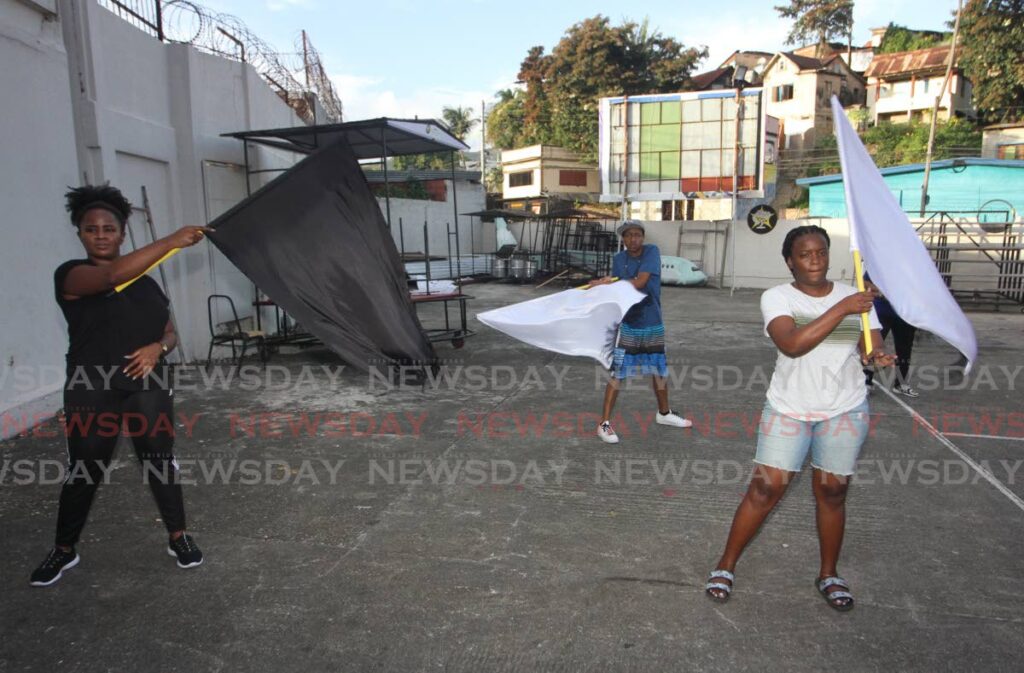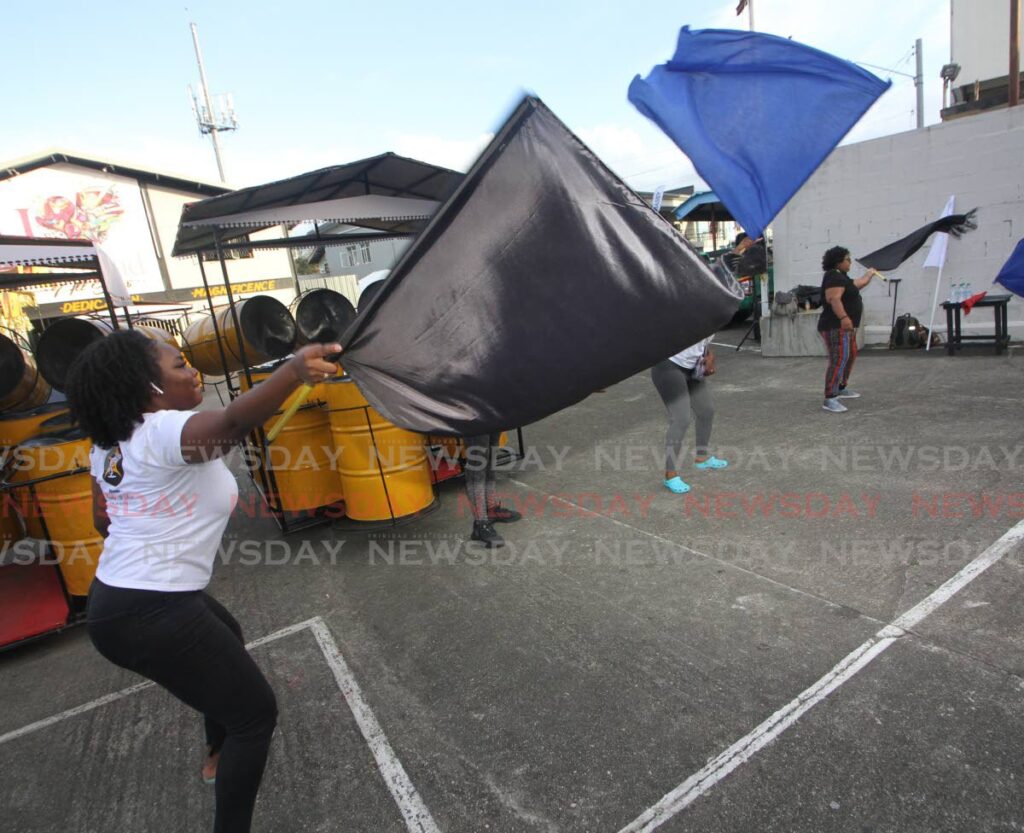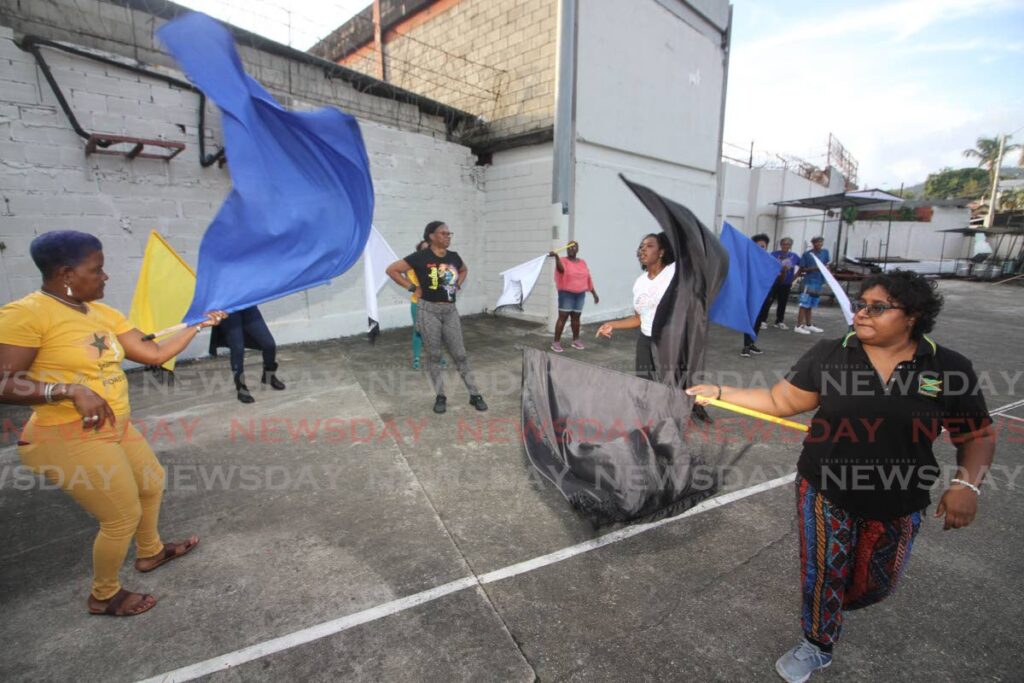Flag-waving workshop teaches traditions, culture

The flagwoman is a leader of a tribe, whether it is a pan side or a J’Ouvert band. She clears space around her on the road.
The ethos of the professional flagwoman is respecting the flag she waves and not letting it touch the ground –in other words, don’t drag the flag!
Some practitioners say respect for this artform is being lost, with the flagwoman being seen as a decorative element or a winer girl.
Approximately ten participants turned out to the inaugural Massy Trinidad All Stars Doh Drag De Flag! flag-waving workshop at its panyard on Duke Street, Port of Spain, on February 15.
Demonstrators Rhonda Allick, who waves the flag for All Stars and the TT Fire Services Steel Orchestra, and Jacqueline Morris, who waves the flag for Shell Invaders Steel Orchestra and 3canal on stage and at J’Ouvert, educated the participants about what being flagwomen meant to them.
Morris said, “The flagwoman is a flag waver, a controller of her space and the space of whoever she leads. She can hold in place, or clear the way, serving as protector and guide, as opposed to the jamette, who will get in your face to protect and defend herself or community, and in contrast to the winer girl, who does not belong with a flag or holding the banner.”
Morris said while some men do wave flags, the position is traditionally held by women.
Allick said dragging or dropping the flag was disrespectful to the band being led.
“It’s not supposed to be touching or sweeping the ground. You’re supposed to know how to carry yourself as a lady.

"It have those who will go and wave their flag but it’s in a vulgar way, it’s not waving flag.
"To me, pan is the national instrument and you have to respect that, and you must respect yourself.”
Over the course of 90 minutes, the women were taught how to wave the flag so that it flowed in front of them or over their heads, how to pass it under their legs and behind their backs, including how to shorten the flag for the vertically challenged, and how to wave it in a crowd without hitting people.
The demonstrators said flagwomen lead pan sides on and off stage, wave the flags non-stop during performances which can be eight minutes or longer, and sometimes lead the bands from the panyards to the Queen's Park Savannah and back – a full night’s work in some cases.
Leading a J’Ouvert band through the streets can also take hours, during which the flagwoman must continually keep the flag active and make sure it doesn’t touch the ground.
Allick and Morris explained that waving a flag was akin to a sport in that you had to warm up beforehand, including the neck, shoulders, arms, wrists, spine, and body. Additionally, they advised eating two hours before a flag-waving session, and knowing how to keep your body fuelled.
Allick said after an initial meal she keeps going all day on very little food – earning her the nickname "the Energizer Bunny" – including water, small snacks, and in an emergency, powermints. Morris said she was the opposite, preferring to eat larger meals throughout the course of the day. She also said powermints were lifesavers during pan songs, giving quick bursts of energy.

PHOTO:ANGELO MARCELLE
15-02-2023 - Angelo Marcelle
The participants were also instructed that the flagwoman follows the rhythm of the music, and since pan tunes especially had layers of rhythm, runs and syncopations, the dancer could choose any one of these to follow.
“Focus on the idea that the flag is a live thing which has its own dance. It is a duet/pas de deux with a flag waver. As the waver moves, the flag reacts and does its own movements in the air. This is done using shoulder, wrist, arm, and body movements. The flag, when held still, can move when the body moves, eg, a quick movement of the torso forward and backward causes a reaction in the flag.”
The workshop was the brainchild of Morris and All Stars administrator Cecilia Thomson-Wilkes. She said mas had been around before pan, some of it originating out of the panyard before it became a panyard, so when Morris approached her about passing on traditions that are dying out, she was all for it.
“Jacqueline came to me with the idea on Thursday, and here we are having the class less than a week later.”
Morris said she wanted the class to be the first in a series which educated people in dying traditions of mas.
“Everybody talks about we’re losing the mas, we’re losing the traditions because people (who practise them) are dying out. When something performative is not practised, unless people practise and perform it, it doesn’t exist. We can write down how to do things, we could watch things, we could have history, we could interview people, but we have to keep practising it. And that’s what we want to do here with this.”
She said while interviewing people and capturing their memories before they pass away is valid and useful, it’s only one part of preserving knowledge.
“The more important part is to keep doing it, to bring more people in to practise it, to make sure we all know the difference between the fireman and the sailor and the king sailor and all the different bat movements and what they mean and why you do it when you do it, and things like that.
"So over a period of time, we want to bring in all of these people, have them teach and we can keep practising those things. Eventually we also want to put these things online so others can also learn.”
Thomson-Wilkes said she specially invited the drama teacher at Trinity Junior Secondary, actress Evelyn Caesar-Munroe, to the workshop, because she knew she would pass it on to her students.
“They do bois as a term-long project, and this term they’re doing sailor mas, so I know if we open the door only for Evelyn to come through, it’s because she will pass it on to all those students.
"Hopefully, we get more teachers, anybody. Tonight we had Massy employees who wanted to wave the big Massy flag and we showed them how.
"This space is open to everybody and everybody is welcome in this space.”
Caesar-Munroe said she’d played a flagwoman in a production of Earl Lovelace’s The Dragon Can’t Dance and it had left an indelible impression on her.
“I’ve always found that the flagwoman is an unsung hero. I look at the flagwoman as a graceful and wonderful spirit who clears the way for a band.
"As Kitchener says, you can’t have a band without a nice flagwoman, and all of that is in tribute to the feminine spirit.
"I really see it as something we’ve inherited, that we’ve sort of turned our backs on, not knowing what the rules are, what the comportment might be.”
Morris said the decline in power of the flagwomen was basic misogyny, as people did not want to see women in charge.
“When they relegate the flagwoman to the winer girl, the decorative, that’s basically to remove the power, because the flagwoman is a powerful being, and when you dress us up like dollies and try and make it into a sex symbol and not a powerful thing of her clearing the space and moving forward, and carrying people and the tribe which she leads forward, you do that to diminish the role of the woman.
“That’s why they like to say, 'You’ve got to put on the shorts and you have to have the weave, you’ve got to be delicate.' Those are the ones they value, and by doing that, you basically remove the power from the woman in mas, by relegating it to a decorative, to a sexual, that sort of thing.
"When (bandleader Raoul) Garib came out (in the 1990s), women took over the road, but now we’re just eye candy on the street, people in thongs. Everything gets smaller and smaller, more decorative and less useful, because how can you function in a thong? It’s not the most practical item of clothing.”
Thomson-Wilkes said people could follow All Stars on social media to know when the next class would be offered.
They can be found at https://www.facebook.com/trinidadallstars.


Comments
"Flag-waving workshop teaches traditions, culture"